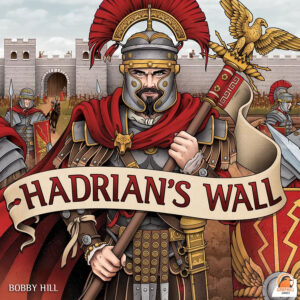 God, not another verb-and-write game. I assume that’s why you clicked here so I’ll jump right into it. Do I think you need another one in your life? No, probably not. But is this one worth checking out? Yeah, I would say so. But you’ll have to read my review to find out why I think that. Or maybe you will just scroll to the bottom and read my summary. I can’t tell you what to do. Live your best life, boo.
God, not another verb-and-write game. I assume that’s why you clicked here so I’ll jump right into it. Do I think you need another one in your life? No, probably not. But is this one worth checking out? Yeah, I would say so. But you’ll have to read my review to find out why I think that. Or maybe you will just scroll to the bottom and read my summary. I can’t tell you what to do. Live your best life, boo.
Hadrian’s Wall, from Renegade Games and Garphill Games, brings you the next flip and write game with a Roman theme you might want to try.
Gameplay Overview:
Before your eyes gloss over the spreadsheet-like player board, let me explain the game in broad strokes because it’s much less overwhelming than at first glance. At the beginning of each round, a card will be flipped over that shows what workers and resources all players begin with. Once you’ve taken those into your supply, each player will draw two cards from their personal deck. Here, you’ll have to decide which card to use for additional resources and which will be your guide for gaining end game points.
Now that you have your workers, resources, and some focus for scoring points, everybody takes their turn until they either run out of workers and resources or can’t place any more. Try to be as efficient as possible because unused resources don’t carry over between rounds. After everyone has placed their workers and used their resources, it’s time to brace for the attack.
Depending on the round and your difficulty setting, a certain number of cards will be drawn. This will show the players where the incoming invaders attack. After the damage is assessed, the round ends and the next one begins. The game will be played over six rounds and at the end, whoever has the most points, wins. Although this doesn’t cover all the ins and outs of the rules, this should give you a pretty good picture of how the game flows.
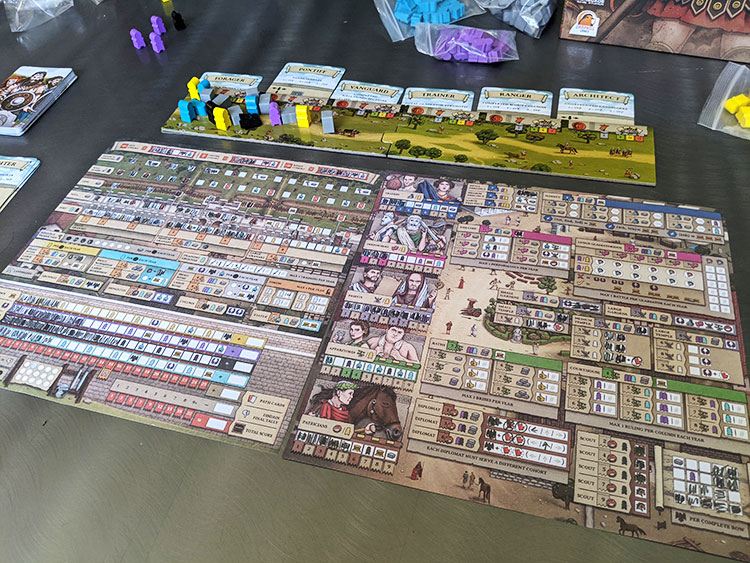
Game Experience:
Verb-and-write games are a dime a dozen. I’ve played somewhere between five and ten, all at different levels of complexity and satisfying gameplay. I don’t go out of my way to play every one of them, but I’m always up for a pleasant surprise. Such is the case with Hadrian’s Wall. It’s got a bit of a learning curve, and I definitely wouldn’t use it to introduce the verb-and-write genre to a newcomer. But if you feel comfortable with the mechanic and have played more complex ones such as Fleet the Dice Game, I think you’ll be right at home and very satisfied with the experience.
There are a lot of choices in what a player can do with their turn. Some might think that the many pathways are too plentiful, but I think that’s one of the benefits of having the end of game bonus cards each round, especially in your first few games; it helps provide direction and it’s the place I’d direct a new player to pay attention to, to avoid having that aimlessly wandering feeling after learning a slightly heavier game.
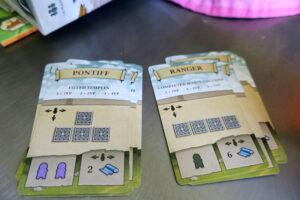
Now what may be satisfying to one person doesn’t mean that it will be for another so let me talk specifically about what I enjoyed most about Hadrian’s Wall. It’s the combos that can be pulled off. While I am admittedly not the most at home as an efficiency player (just go read Andrew’s Tapestry review to see how terrible I am), this game forced me to be efficient in order to hit some very satisfying combos. Properly setting myself up at the end of one round to trigger the ability for me to gain four additional workers by one action, it doesn’t get much more satisfying than that.
But even if efficiency and planning ahead is not your strong suit, you’ll still be able to hit some bonuses, and it will definitely get those mental wheels spinning about how you can do that more often. I know it made me think about that after my first game and how I might play better against my next opponent.
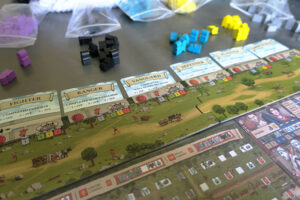
Speaking of opponents, let’s talk about the level of interaction and how well the game scales. Hadrian’s Wall is by and large a solo experience. Your actions won’t set your neighbors back and typically will actually benefit them as well as yourself. For example, there is a scout action that allows you to Tetris-style fill in a section of your board to gain some benefits. You can use your neighbor’s shape and give them a resource to use. Some people might find this level of interaction boring and not aggressive enough, but it’s honestly par for the course for verb-and-write games.
So how well does the game scale in player count? By and large, quite well. The rules don’t change much, so you won’t have to learn a very modified version of the game if you decide to play with two or five people. What changes are there are pretty minor and easy to remember. But regardless of the number of people you can get to play, I think all will have an equally enjoyable experience.
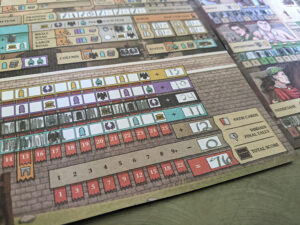
I want to talk a minute about the theme, specifically a particular aspect of it that I feel some users would want to know about and could possibly impact their decision to buy the game. First off, obviously, it’s a Roman theme as you could probably tell from the artwork but really it could have been anything. The theme wasn’t really integral to this design. But a particular aspect of this theme, which they make a point about in the rule book, is the fact that one of the represented workers are slaves.
It feels very weird to me to play a game that has slaves in it, especially when you start to look around the board and see how they are used, which is usually in labor or other expendable roles and that feels really uncomfortable. Now before you think I’m getting on a soapbox for cancel culture, I understand that slavery was a part of Roman society. Anybody who’s completed high school knows this fact and I’m not denying its history. I’m simply saying, did that really need to be an aspect in this entertainment medium? I don’t think so. In fact, an easy fix for this could have been having different colored workers with no titles. Theme is pretty irrelevant, especially for a verb-and-write game, at least that’s mostly been my experience. So I wish something else had been done on this aspect of the workers.
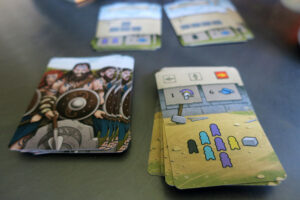
Lastly, I don’t typically comment on the price of a game, but I feel like that’s necessary here. If you’ve been in the market for other verb-and-write games in the past, you’re probably used to paying no more than forty dollars tops. The MSRP for Hadrian’s Wall is fifty-five and I think that’s more than most people would pay, especially for this type of game. This game comes with a ton of sheets. Like, it fills 75 percent of the box. So you’re definitely going to be able to play it a lot. Probably not fifty times but you’ll be able to play it enough that you’d still have plenty leftover when you eventually sell it.
Final Thoughts:
Overall, Hadrian’s Wall is a really enjoyable flip-and-write game, maybe one of the best I have played. With the numerous pathways and strategies for people to try out, I think folks who get into it will want to play it many times. Although I don’t think this is a game for beginners of this mechanic, it’s easy enough to learn the basic concepts and play through a game. While hitting combos made me feel like I was getting this whole efficiency playing thing down, my opinion of Hadrian’s Wall overall was a little tainted by the inclusion of slaves into a theme that didn’t require it.
Final Score: 4.5 Stars – A bit overpriced but very solid flip-and-write game
 Hits:
Hits:
• Lots of pathways and strategies will equal a lot of repeat plays
• More advanced verb-and-write gamers will appreciate the complexity
• The game scales well
• Not many special rules to remember if you’re playing with two or fewer people
Misses:
• MSRP might be a hard justification for some
• Slaves are a part of the “theme” and it wasn’t necessary























“Tainted by the inclusion of slaves”… Ok. 🙄
K…
While they could have left out the slaves, we are, after all still talking about the Roman Empire and much of their economy was based on slaves.
Even though they’re made for entertaining, I also think boardgames can and should be a learning medium. And how can we learn about things without calling them by their names? Do we condone that behavior? Of course not, but we also can’t deny it’s existence and how much it actually defined the Roman Empire.
As a species we evolved with rights and wrongs, even if each nation’s history books tend to minimize the latter, we can’t dismiss the greatness of the Roman Empire just because they also did horrible things. We just need to be able to praise the good and not repeat the bad. I think “canceling” is actually the worst thing we can do because we don’t get learn and identity the good from the bad and it creates sides and tentions between us all.
Regarding this game in particular, the designers put a disclaimer in the beginning of the rulebook, explaining their decision. In my opinion even that should have been a given and not to require an explanation, but nowadays it’s like people are trying to take things personally and unable to see things objectively and most importantly learn from it.
I apologize for the long rant, but I feel that this “side” of the story is purposely overlooked in this day and age, out of fear of being called discriminative.
Have a good one and thanks for the review!
When something is based on factual history, NO such disclaimer is needed. If people are that weak and frail to not face the facts, then I feel very sorry for those individuals. God forbid if you call them out on this stuff in person instead of being able to hide behind a computer screen like Jason Klem is doing. I’d love to give him a piece of mind face to face, believe me!
Haha, look at you getting so triggered by an opinion that you’re wanting to confront them face to face.
I agree with the majority here. To cut out slavery just because it’s not nice is wrong. Does this mean we can’t watch a movie because it has slavery in it? No; it’s educational in a movie, and it is here in a board game too.
If my kids said, “How were the pyramids built”? I’m not going to say… “ummm… look over there! What’s that”? If we can’t talk about it and accept it as history, then how will we ever learn and change.
We need more games like this. Two thumbs up here.
It’s absolutely crazy what’s going on these days with people getting all up in arms over the term, “slaves”. This was a part of history, moron! No doubt that the 1/2 star taken off was due to his slave comment. How old is this Jason Klem anyway? Looks 20-something, part of that irrational “woke” crowd of gullible indoctrinated cretins. I hope to see MORE games being made based on FACTUAL HISTORY, including controversial themes such as slavery, colonization, Nazi Germany, etc. In fact, I’m going to bust out my copy and play Freedom Underground Railroad, a GREAT co-op game that Klementine over there would enjoy.
Slavery is still part of our lives today, in Asia, Turkey, Africa… Slavery wasn’t eradicated, and it might never be. Making it controversial and putting it under the rug does more harm than openly talking about it. Let it be known that our history was cruel and that our today still is. Feeling of shame about it is what will drive us to do something. Indifference that comes from hiding of offensive things is the reason slavery is still with us all these years.
Stop acting like an American. Slavery happened, grow up.